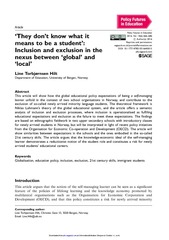‘They don’t know what it means to be a student’: Inclusion and exclusion in the nexus between ‘global’ and ‘local’
Peer reviewed, Journal article
Published version

Åpne
Permanent lenke
https://hdl.handle.net/1956/12691Utgivelsesdato
2016-05-06Metadata
Vis full innførselSamlinger
- Department of Education [300]
Originalversjon
https://doi.org/10.1177/1478210316645015Sammendrag
This article will show how the global educational policy expectations of being a self-managing learner unfold in the context of two school organisations in Norway, and contribute to the exclusion of so-called newly arrived minority language students. The theoretical framework is Niklas Luhmann’s theory of the global educational system, and the article offers a semantic analysis of inclusion and exclusion processes, where inclusion is operationalised as fulfilling educational expectations and exclusion as the failure to meet these expectations. The findings are based on ethnographic fieldwork in two upper secondary schools with introductory classes for newly arrived students in Norway, but will be interpreted in light of recent policy initiatives from the Organisation for Economic Co-operation and Development (OECD). The article will show similarities between expectations in the schools and the ones embodied in the so-called 21st century skills. The article argues that the knowledge-economic ideal of the self-managing learner demonstrates a reductionist notion of the student role and constitutes a risk for newly arrived students’ educational careers.
